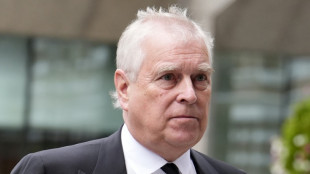-
 Iran's Khamenei likens protests to 'coup', warns of regional war
Iran's Khamenei likens protests to 'coup', warns of regional war
-
New Epstein accuser claims sexual encounter with ex-prince Andrew: report

-
 Italy's extrovert Olympic icon Alberto Tomba insists he is 'shy guy'
Italy's extrovert Olympic icon Alberto Tomba insists he is 'shy guy'
-
Chloe Kim goes for unprecedented snowboard halfpipe Olympic treble

-
 Pakistan combing for perpetrators after deadly separatist attacks
Pakistan combing for perpetrators after deadly separatist attacks
-
Israel partially reopens Gaza's Rafah crossing

-
 Iran declares European armies 'terrorist groups' after IRGC designation
Iran declares European armies 'terrorist groups' after IRGC designation
-
Snowstorm disrupts travel in southern US as blast of icy weather widens

-
 Denmark's Andresen swoops to win Cadel Evans Road Race
Denmark's Andresen swoops to win Cadel Evans Road Race
-
Volkanovski beats Lopes in rematch to defend UFC featherweight title

-
 Sea of colour as Malaysia's Hindus mark Thaipusam with piercings and prayer
Sea of colour as Malaysia's Hindus mark Thaipusam with piercings and prayer
-
Exiled Tibetans choose leaders for lost homeland

-
 Afghan returnees in Bamiyan struggle despite new homes
Afghan returnees in Bamiyan struggle despite new homes
-
Mired in economic trouble, Bangladesh pins hopes on election boost

-
 Chinese cash in jewellery at automated gold recyclers as prices soar
Chinese cash in jewellery at automated gold recyclers as prices soar
-
Israel to partially reopen Gaza's Rafah crossing

-
 'Quiet assassin' Rybakina targets world number one after Melbourne win
'Quiet assassin' Rybakina targets world number one after Melbourne win
-
Deportation raids drive Minneapolis immigrant family into hiding

-
 Nvidia boss insists 'huge' investment in OpenAI on track
Nvidia boss insists 'huge' investment in OpenAI on track
-
'Immortal' Indian comics keep up with changing times

-
 With Trump mum, last US-Russia nuclear pact set to end
With Trump mum, last US-Russia nuclear pact set to end
-
In Sudan's old port of Suakin, dreams of a tourism revival

-
 Narco violence dominates as Costa Rica votes for president
Narco violence dominates as Costa Rica votes for president
-
Snowstorm barrels into southern US as blast of icy weather widens

-
 LA Olympic chief 'deeply regrets' flirty Maxwell emails in Epstein files
LA Olympic chief 'deeply regrets' flirty Maxwell emails in Epstein files
-
Rose powers to commanding six-shot lead at Torrey Pines

-
 Barca wasteful but beat Elche to extend Liga lead
Barca wasteful but beat Elche to extend Liga lead
-
Konate cut short compassionate leave to ease Liverpool injury crisis

-
 Dodgers manager Roberts says Ohtani won't pitch in Classic
Dodgers manager Roberts says Ohtani won't pitch in Classic
-
Arsenal stretch Premier League lead as Chelsea, Liverpool stage comebacks

-
 Korda defies cold and wind to lead LPGA opener
Korda defies cold and wind to lead LPGA opener
-
New head of US mission in Venezuela arrives as ties warm

-
 Barca triumph at Elche to extend Liga lead
Barca triumph at Elche to extend Liga lead
-
Ekitike, Wirtz give Liverpool sight of bright future in Newcastle win

-
 West Indies 'tick boxes' in shortened T20 against South Africa
West Indies 'tick boxes' in shortened T20 against South Africa
-
Chelsea have something 'special' says Rosenior

-
 De Zerbi 'ready to go to war' to solve Marseille troubles
De Zerbi 'ready to go to war' to solve Marseille troubles
-
Hornets hold off Wemby's Spurs for sixth NBA win in a row

-
 Moyes blasts killjoy booking after Everton's late leveller
Moyes blasts killjoy booking after Everton's late leveller
-
Ex-prince Andrew again caught up in Epstein scandal

-
 Bayern held at Hamburg to open door for Dortmund
Bayern held at Hamburg to open door for Dortmund
-
Atletico stumble to draw at Levante, Villarreal held

-
 Chelsea stage impressive fightback to beat West Ham
Chelsea stage impressive fightback to beat West Ham
-
Arsenal stretch Premier League lead, Chelsea fightback breaks Hammers' hearts

-
 Napoli edge Fiorentina as injury crisis deepens
Napoli edge Fiorentina as injury crisis deepens
-
How Lego got swept up in US-Mexico trade frictions

-
 UK rights campaigner Tatchell arrested at pro-Palestinian protest
UK rights campaigner Tatchell arrested at pro-Palestinian protest
-
Iran says progress made towards US talks despite attack jitters

-
 'Empowering': Ireland's first female sumo wrestler blazes a trail
'Empowering': Ireland's first female sumo wrestler blazes a trail
-
US judge denies Minnesota bid to suspend immigration sweeps

How Swiss Stocks tamed Prices
How Switzerland used equity-backed reserves to keep prices in check - Switzerland’s recent inflation performance is striking by any international standard. While much of the developed world grappled with price rises far above target, Swiss consumer-price inflation has been brought back to muted rates and, at times, hovered close to zero. The country did not stumble upon a miracle cure. Rather, it relied on an institutional playbook that blends a credible inflation target, a strong and freely moving currency—and, crucially, a uniquely structured central‑bank balance sheet in which roughly a quarter of foreign‑exchange reserves is invested in global equities.
At the heart of the Swiss approach lies the exchange‑rate channel. For more than a decade the Swiss National Bank (SNB) accumulated very large foreign‑currency reserves to manage excessive upward pressure on the franc. Those reserves are diversified across currencies and asset classes, with a deliberately significant allocation to equities managed on a passive, market‑neutral basis. Building a portfolio that earns an equity risk premium over time was not an end in itself; it was a way to improve the risk‑return profile of the reserves while maintaining ample firepower for currency operations.
That firepower proved pivotal when global energy and goods prices surged. In 2022 and 2023 the SNB shifted stance and used its reserves in the opposite direction—selling foreign currency to allow a measured appreciation of the franc. A stronger franc lowers the local‑currency price of imported goods and services, damping inflation via “imported disinflation”. Because the reserves had been amassed in earlier years, and because a sizeable slice was in equities that tended to deliver solid returns over time, the central bank could act decisively without jeopardising balance‑sheet resilience.
The portfolio structure also matters for confidence. An equity share—held broadly across markets and sectors, with exclusions on ethical grounds and with no investments in Swiss companies—signals that the reserves are not a dormant hoard but a well‑diversified buffer aligned with long‑run value preservation. When equity markets rose strongly in 2024, gains on those holdings (alongside gold and currency effects) replenished the central bank’s financial buffers. That, in turn, reinforced the credibility of policy at precisely the moment when keeping inflation expectations anchored was most important.
None of this should be mistaken for the SNB “using the stock market” as its primary inflation tool. Monetary policy still rests on an explicit price‑stability objective, a conditional inflation forecast and the policy rate. Indeed, as inflation returned to the target range, the policy rate could be reduced again in 2024–2025. But the equity‑backed reserves shaped the backdrop: they made it easier to tighten monetary conditions through the exchange rate when prices were accelerating, and they underpinned confidence in subsequent easing once inflation receded.
Switzerland’s low and recently near‑zero inflation cannot be ascribed to reserves alone. The country’s energy mix and regulated price components dampened the direct pass‑through from global fuel shocks; the consumption basket assigns a smaller weight to energy than in many peers; and the franc’s safe‑haven status consistently mutes imported price pressures. What distinguishes the Swiss case is how these structural features were complemented by an ample, well‑diversified reserve portfolio—including global equities—that allowed timely foreign‑exchange operations without calling market confidence into question.
The lesson is not that every central bank should load up on shares. Institutional mandates, legal frameworks, market depth and exchange‑rate regimes differ widely. Rather, Switzerland shows that, for a small open economy with a safe‑haven currency, a disciplined, transparent reserve strategy—one that tolerates equity exposure while avoiding conflicts of interest at home—can support the nimble use of the exchange‑rate channel. In the inflation shock of recent years, that combination helped bring prices back under control.
As of late summer 2025, Switzerland’s inflation remains subdued and close to the midpoint of its price‑stability range. The franc is firm, policy is data‑driven, and the central bank’s balance sheet—anchored by highly liquid bonds and a passive equity allocation—retains the flexibility to lean against renewed price pressures or, if conditions warrant, to cushion the economy. Switzerland did not “magic away” inflation by buying shares; it designed a balance sheet that could do its day job when it mattered.

Israel’s Haredi Challenge

Miracle in Germany: VW soars

Pension crisis engulfs France

A new vision for Japan

The Fall of South Korea?

Gaza on the cusp of civil war

Israel: Economy on the edge

Why Russia can’t end war

Rare Earth Standoff

Tanks in Gaza - Hopes dim?

Poland trusts only hard Power



